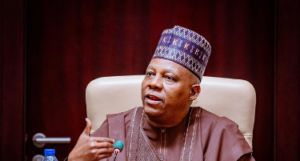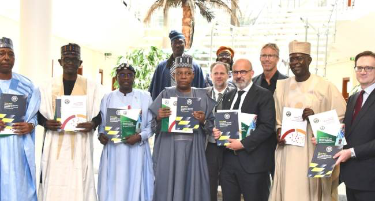Vice President Kashim Shettima has called for a global partnership to tackle the problem of internal displacement in Nigeria.
He made the call during the “Launch of the State Action Plans on Durable Solution to Internal Displacement” to be implemented in four northern states of Adamawa, Benue, Borno, and Yobe, held at the Presidential Villa Abuja.
In a statement by his Special Assistant on Media and Communications, Stanley Nkwocha, the Vice President outlined the strategy adopted by the President Bola Tinubu administration in tackling Nigeria’s internal displacement challenge, saying the nation prioritises the welfare of its people, particularly in these critical times.
He pledged the Federal Government’s unwavering commitment to ensuring the safety and well-being of displaced citizens.
The Action Plan is a United Nations Secretary General’s Solution Agenda on Internal Displacement which aims to help internally displaced persons find a durable solution to their displacement, prevent new displacement crises from emerging, and ensure those facing displacement receive effective protection and assistance.
Unveiling the programme, Shettima said, “For a country that has endured the devastations of economic disadvantages across generations, we cannot afford further expansion in the displacement of our people. So, we remain committed to ensuring that each displaced individual returns to a safer environment and is given a lifeline to start afresh.”
He recalled his experience dealing with conflict and displacement just as he emphasised the need for a collaborative, cross-border approach to tackling the multifaceted challenge.
“Let us harness the strength of our partnerships, both local and international, to bring about lasting change,” he said.
The Vice President welcomed the support of the United States and other global partners, stressing that the task ahead demands a united front that transcends political divides.
“We are here to craft solutions that will outlive us, that will offer future generations a place of hope, a home for all, and a land of opportunity where dreams can be pursued without worry. The journey is not merely about addressing the symptoms of displacement but also about tackling the root causes,” he stated.
Outlining the strategy of the Tinubu administration, Shettima pledged investment in sustainable development, education, and economic opportunities as critical components of a comprehensive solution.
Speaking virtually through an online conferencing platform, UN Deputy Secretary-General, Ms. Amina J. Mohammed, said attaining such solutions “is a priority for Nigeria and for the United Nations Secretary-General,” noting the global number of internally displaced persons has doubled in ten years to nearly 76 million globally.
“Over four million Nigerians remain in search of solutions to their forced displacement,” she stated, adding that the state action plans “capture the first essential steps towards solutions.”
Earlier in his remarks, the UN Assistant Secretary-General and Special Advisor on Durable Solutions, Robert Piper, commended Nigeria’s commitment and leadership in being the first country among the 15 pilot countries to launch the programme.
Piper said the launch of the programme is evidence of the political commitment to addressing the plight of IDPs in Nigeria, noting that “in many ways, the plans you launch today provide a model of how governments can take responsibility for ending displacement.
On his part, Borno State Governor, Babagana Zulum, said the state government is fully committed to the implementation of the Action Plans on Durable Solutions, noting that 15% of the state’s annual budget will be dedicated to projects undertaken under the initiative.
Zulum recalled the efforts of the state government in the past few years in returning displaced persons to their communities, assuring stakeholders at the meeting that the government’s commitment to the cause of displaced persons remains unwavering.
On his part, Governor Hyacinth Alia of Benue State said the launch of the State Action Plans on Durable Solutions to Internal Displacement is a beacon of hope and a catalyst for the transformation of lives and livelihoods in communities affected by conflict.
He commended Shettima’s inspirational leadership as well as the commitment of all the development partners in the project which he said aligns with the vision of the Benue State government to build a society where all residents can live in peace and harmony.
In the same vein, Yobe State Governor, Mai Mala Buni, said the state government has executed projects across health, education, social welfare, and security, in a bid to ensure that displaced persons return to their communities.

He reaffirmed the commitment of the state government to the operationalisation of the action plan by allocating 5% of the state’s annual budget over the next three years.
Governor Buni called on development partners involved in the programme not to relent in their efforts toward the success of the initiative.
The representative of Adamawa State Governor and Commissioner for Reconstruction, Rehabilitation, Reintegration, and Human Service, Bello Hamman Diram, announced the state government’s allocation of 7% of its annual budget to the implementation of the Action Plans on Durable Solutions.
On his part, the British High Commissioner to Nigeria, Richard Montgomery, commended the progress witnessed during his recent visit to the North-East and the government’s approach to encouraging more development investments.
“The progress I witnessed during my visit to the North-East recently deserves commendation. “Nigeria is the first to prove that government-led intervention is possible. We are proud to be part of the process,” he stated.
He also called for the mobilisation of new financing, saying “We need to mobilise additional bilateral and multilateral financing to support these plans”.




